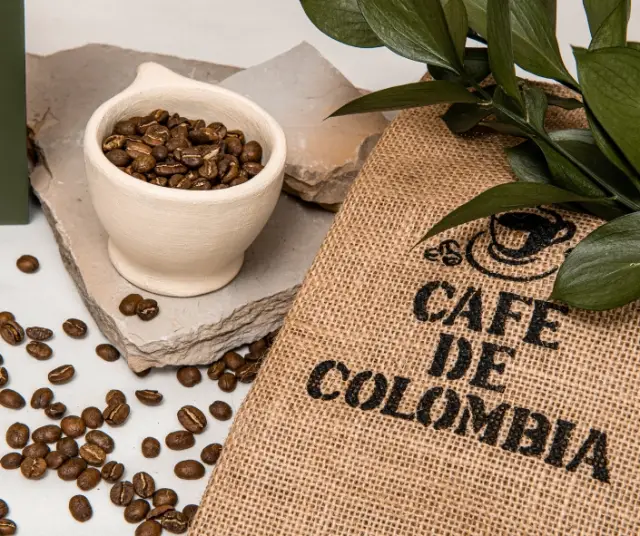Colombian coffee is recognized throughout the world for its quality, unmatched flavor and captivating aroma. Colombia is one of the world's leading coffee producers and has set a standard of excellence in the coffee industry.
The History of Coffee in Colombia
The history of coffee in Colombia is a fascinating journey that goes back to the dawn of Spanish colonization in Latin America. Although coffee does not originate in Colombia, its arrival and evolution in the country have left a deep mark on the Colombian economy and culture.
Coffee arrived in Colombia in the 18th century through the Spanish colonizers. However, it was not until the 19th century that it began to be cultivated commercially. The coffee region of Colombia, known as the "Coffee Zone" or the " Coffee Axis ", comprises several departments, including Caldas, Quindío, Risaralda, and Valle del Cauca , among others. These mountainous regions offer the ideal climatic and geographical conditions for growing coffee.
One of the key moments in the history of Colombian coffee was the introduction of the Arabica coffee variety. This variety, known for its mild and fruity flavor, has adapted perfectly to the soil and climate of Colombia. Throughout the 19th century, coffee became an important engine of the Colombian economy, generating significant income and attracting investment in infrastructure.
The coffee boom in Colombia brought with it a boom in European immigration, as many Europeans, mostly Italians, came to the country to participate in the growing coffee industry. These immigrants contributed to the expansion of coffee plantations and the development of advanced cultivation and processing techniques.
Colombian coffee has also played an important role in the country's political and social history. During the 20th century, the National Federation of Colombian Coffee Growers was established, a non-profit organization that works to promote and protect the quality of Colombian coffee in the global market. Additionally, coffee has been used as a means to promote peace and development in rural areas of Colombia, contributing to social stability in the country.
Varieties of Colombian Coffee
Colombia is known for its production of Arabica coffee, which is highly valued throughout the world. Arabica coffee varieties grown in Colombia include:
caturra
The Caturra variety is known for its small grains and its smooth, sweet flavor. It is one of the most popular varieties in Colombia and is grown throughout the country.
typical
Typica coffee is prized for its balance and complexity of flavors. It is cultivated in several Colombian regions and is known for its smooth and fruity flavor.
bourbon
Bourbon coffee is characterized by its sweet and smooth flavor with notes of caramel and chocolate. It is cultivated in mountainous regions of Colombia.
Geisha
The Geisha variety is known for its exceptionally delicate and floral flavor. Although it is originally from Ethiopia, it has gained popularity in Colombia and is appreciated by coffee connoisseurs.
Colombian Coffee Production Process
Coffee production in Colombia is a meticulous process that involves several stages, from planting to cup. Here are the key steps:
- Planting and Cultivation: Coffee is grown on farms and plantations throughout the country. Mountainous regions and different altitudes allow for a wide variety of flavor profiles in the beans.
- Harvest: The coffee harvest is usually carried out manually, which ensures that only the ripe beans are picked. This translates into superior coffee quality.
- Processing: Coffee beans are processed by wet or dry methods. Wet processing involves extracting the coffee beans from the cherry and fermenting them before drying. Dry processing consists of drying whole cherries in the sun.
- Roasting: Roasting coffee is a crucial stage that profoundly affects its flavor and aroma. Colombian roasters are experts in highlighting the unique characteristics of each bean.
- Grinding: Roasted coffee beans are ground to prepare coffee. The grind can be coarse or fine, depending on the desired preparation method.
- Preparation: Colombian coffee can be prepared in a variety of ways, including the traditional filter coffee maker, the French press, and the espresso machine. Each method highlights different aspects of the coffee flavor.
Colombian Coffee and Culture
Coffee in Colombia goes beyond being a simple drink; it is an integral part of national culture and identity. The coffee farms, known as "coffee farms," are popular destinations for tourists who want to experience Colombian coffee culture up close. Farm tours allow visitors to learn about the production process, from planting to cup, and taste fresh coffee.
Coffee also plays an important role in Colombian social life. The "coffee shots" are moments of meeting and conversation between friends and family. Colombian coffee is appreciated for its smooth and balanced flavor, which makes it a versatile drink that can be enjoyed at any time of the day.
Colombian coffee is one of the country's most important export products. The National Federation of Colombian Coffee Growers, a non-profit organization, works to promote and protect the quality of Colombian coffee in the global marketplace. The "Café de Colombia" seal is a recognition of the high quality and distinctive flavor of Colombian coffee beans.
